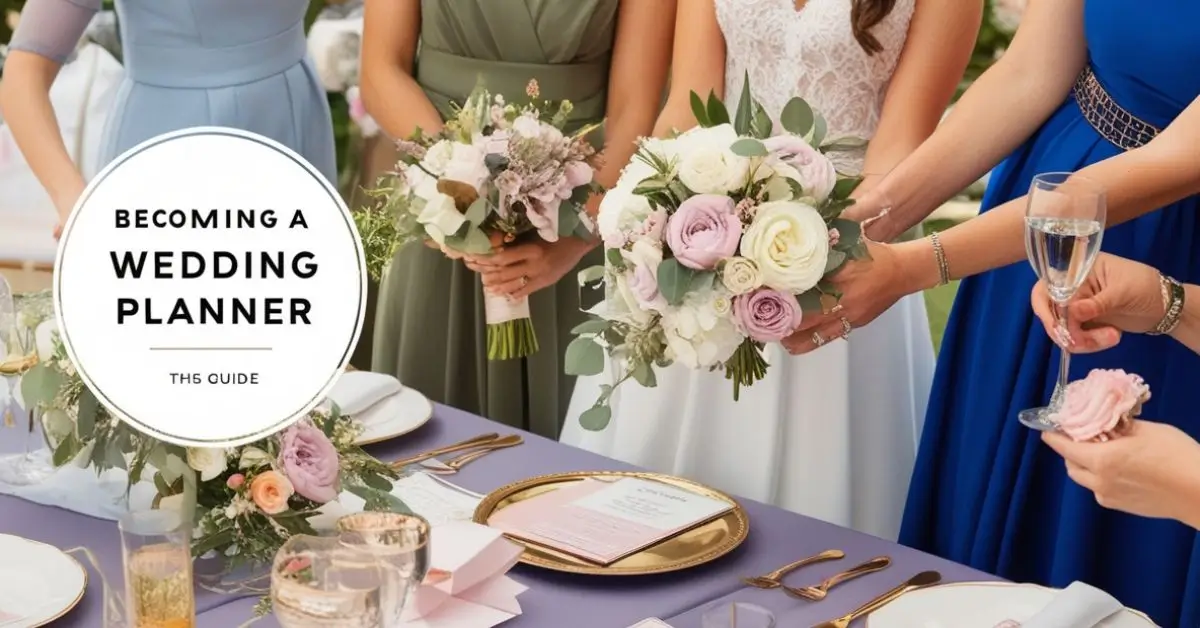Becoming a wedding planner is a rewarding career for those who love organization, creativity, and working with people. This guide will take you through the essential steps to kick-start your journey into the world of wedding planning, ensuring you have the knowledge and skills to succeed in the industry.
1. Understand the Role of a Wedding Planner
Before embarking on your wedding planning career, it’s essential to have a clear understanding of what the job entails. A wedding planner is responsible for organizing and coordinating every detail of a wedding, from the initial stages to the final farewell. Their duties include:
- Consulting with clients: Meeting with couples to understand their wedding vision, preferences, and budget.
- Vendor coordination: Sourcing, hiring, and managing relationships with vendors such as caterers, florists, photographers, and musicians.
- Budget management: Ensuring that the wedding is planned within the client’s budget, managing payments, and offering cost-saving advice where needed.
- Timeline creation: Developing a detailed schedule for the event, ensuring that every part of the day runs smoothly.
- Problem-solving: Managing any unexpected issues or challenges that arise before or during the wedding day, ensuring that the couple’s day goes as planned.
Understanding the responsibilities involved will help you decide if this career aligns with your skills and interests.
2. Gain Relevant Education and Training
While a formal degree is not mandatory to become a wedding planner, relevant education and training can provide a strong foundation. Several pathways can help you gain the knowledge needed to succeed:
- Online Courses: Numerous online platforms offer wedding planning courses that cover the fundamentals of the job. These courses usually include topics such as client communication, vendor coordination, budgeting, and event design.
- Workshops and Seminars: Workshops provide hands-on, in-depth training. Many of them focus on specific aspects of wedding planning, such as floral design or wedding coordination.
- University Programs and Certifications: Some universities and colleges offer event management or wedding planning programs. These formal education options are great for those seeking a more structured learning experience, complete with certifications that add credibility to your skill set.
By enrolling in these courses, you’ll gain the necessary skills, industry knowledge, and professional certifications that can boost your confidence and marketability.
3. Get Practical Experience
Education and training provide a solid foundation, but practical experience is crucial for becoming a successful wedding planner. Here’s how you can gain hands-on experience:
- Internships: Working as an intern with established wedding planners or event management companies allows you to observe and participate in real-life planning. This is a great way to get a feel for the industry’s challenges and nuances while also building valuable connections.
- Volunteering: Another excellent way to gain experience is by volunteering to help plan weddings for friends or family. This allows you to practice coordinating tasks and learn firsthand what it takes to organize a wedding from start to finish.
- Entry-Level Jobs: You can also consider starting in entry-level positions, such as an event coordinator or assistant at a wedding venue or planning company. This will give you exposure to the day-to-day responsibilities of a wedding planner, such as managing timelines, communicating with vendors, and handling logistics.
4. Develop Essential Skills
To succeed as a wedding planner, there are several key skills you must cultivate:
- Organization: A wedding planner must juggle many tasks simultaneously. From arranging contracts to managing schedules, your organizational skills will be tested daily. A wedding planner must be able to manage multiple aspects of a wedding with precision.
- Communication: Being a strong communicator is crucial. You’ll need to clearly convey ideas to clients and vendors, negotiate prices, and handle stressful situations with ease. Good communication ensures that everyone involved is on the same page and that no detail is overlooked.
- Problem-Solving: Weddings rarely go off without a hitch, and planners must be able to think quickly and solve problems as they arise. Whether it’s a vendor cancellation or unexpected weather, your ability to resolve issues with grace will set you apart.
- Creativity: Wedding planners often work with couples to bring their dream day to life. Creativity is key to designing beautiful events, selecting unique themes, and ensuring every detail matches the couple’s vision.
- Time Management: The ability to prioritize tasks, manage a tight schedule, and ensure deadlines are met is essential. A wedding planner’s role is to keep the event moving smoothly and on time, and effective time management ensures nothing is left to chance.
5. Build a Strong Network
Networking is a vital component of any event planning career, especially in the wedding industry. A wedding planner works with a range of professionals, from florists to photographers, to caterers and DJs. The more people you know in the industry, the better your chances of finding quality vendors for your clients. Here’s how to build a solid network:
- Attend Wedding Expos and Trade Shows: Bridal shows, wedding fairs, and other industry events are excellent opportunities to meet vendors, clients, and fellow planners. These events often feature the latest wedding trends and can help you stay up to date with what’s popular in the industry.
- Join Professional Associations: Becoming a member of a wedding planning organization can help you build credibility, access valuable resources, and network with other planners and vendors. These groups may also offer continuing education, certifications, and job opportunities.
- Partner with Vendors: Collaborating with photographers, caterers, and florists can help you create an all-in-one wedding planning service. Building strong relationships with trusted vendors ensures that you can recommend the best to your clients.
6. Start Your Own Wedding Planning Business
If you’re passionate about becoming a wedding planner and are ready to take the leap, you may want to start your own business. Running your own company gives you full creative control and the ability to build your brand. Here’s how to set up your wedding planning business:
- Write a Business Plan: A solid business plan will outline your services, target market, and financial projections. It will also define how you intend to market your services and attract clients.
- Legal Requirements: Register your business and obtain any necessary licenses or permits. Depending on where you live, you may need specific permits or insurance to operate legally.
- Marketing: Set up a website to showcase your services and create an online portfolio. Additionally, use social media platforms to share wedding planning tips, behind-the-scenes photos, and customer testimonials. Word of mouth is powerful in the wedding industry, so providing excellent service will encourage clients to refer you to their friends and family.
7. Continue Learning and Evolving
The wedding industry is constantly changing, with new trends, technologies, and best practices emerging every year. To stay competitive and relevant, it’s important to keep learning and growing as a professional. Here’s how you can continue to develop your skills:
- Take Continuing Education Courses: Many professional associations offer advanced courses for wedding planners who want to refine their skills or learn new techniques.
- Stay on Top of Industry Trends: Follow wedding blogs, magazines, and social media pages to keep up with the latest styles, designs, and trends in the wedding industry.
- Seek Feedback: Regularly ask for feedback from your clients to improve your services. Positive reviews can help you grow your reputation, while constructive criticism can guide your professional development.
8. Specialize in a Niche
As you gain experience, you may decide to specialize in certain types of weddings or events. Specializing can help you stand out in a competitive market and attract a targeted audience. Some common niches for wedding planners include:
- Destination Weddings: Planning weddings in beautiful or exotic locations requires a deep understanding of travel logistics, legal requirements, and vendor relationships in different regions.
- Themed Weddings: If you have a passion for creativity, specializing in themed weddings allows you to work on unique and personalized events, from vintage to fairy-tale weddings.
- Corporate Weddings: Some wedding planners focus on corporate clients, planning high-end weddings for CEOs, executives, or other business professionals. These weddings often have larger budgets and more intricate planning needs.
9. Overcome Challenges with Professionalism
Wedding planning can be stressful, and it’s inevitable that challenges will arise. How you handle these challenges can determine your success in the industry. Here’s how to stay calm under pressure:
- Set Clear Expectations: Communicate clearly with clients to ensure everyone is on the same page regarding expectations, timelines, and budgets. When expectations are met, your clients are more likely to be satisfied.
- Have Contingency Plans: Develop backup plans for common issues, such as inclement weather or last-minute cancellations. Being prepared for anything gives you confidence in handling unexpected situations.
- Stay Calm and Professional: Maintain professionalism at all times, even when things go wrong. Clients appreciate a calm, collected wedding planner who can solve problems efficiently.
10. Build a Portfolio and Collect Testimonials
A strong portfolio and positive client testimonials are vital to growing your wedding planning business. A portfolio showcases your skills and experience, while testimonials help establish trust with potential clients. Here’s how to build both:
- Create an Online Portfolio: Document your best work by taking high-quality photos of weddings you’ve planned. A website with a gallery of these photos helps potential clients visualize your style and capabilities.
- Request Reviews: After every wedding, ask your clients for feedback. Positive reviews and word-of-mouth referrals are powerful marketing tools.
Conclusion
Becoming a wedding planner requires hard work, dedication, and the right set of skills. By gaining experience, building relationships, and continually learning, you can carve out a successful career in the wedding planning industry. Whether you choose to work for an established company or start your own business, the wedding industry offers ample opportunities to create memorable experiences for couples on their special day. With patience and perseverance, you can turn your passion for weddings into a fulfilling profession.












